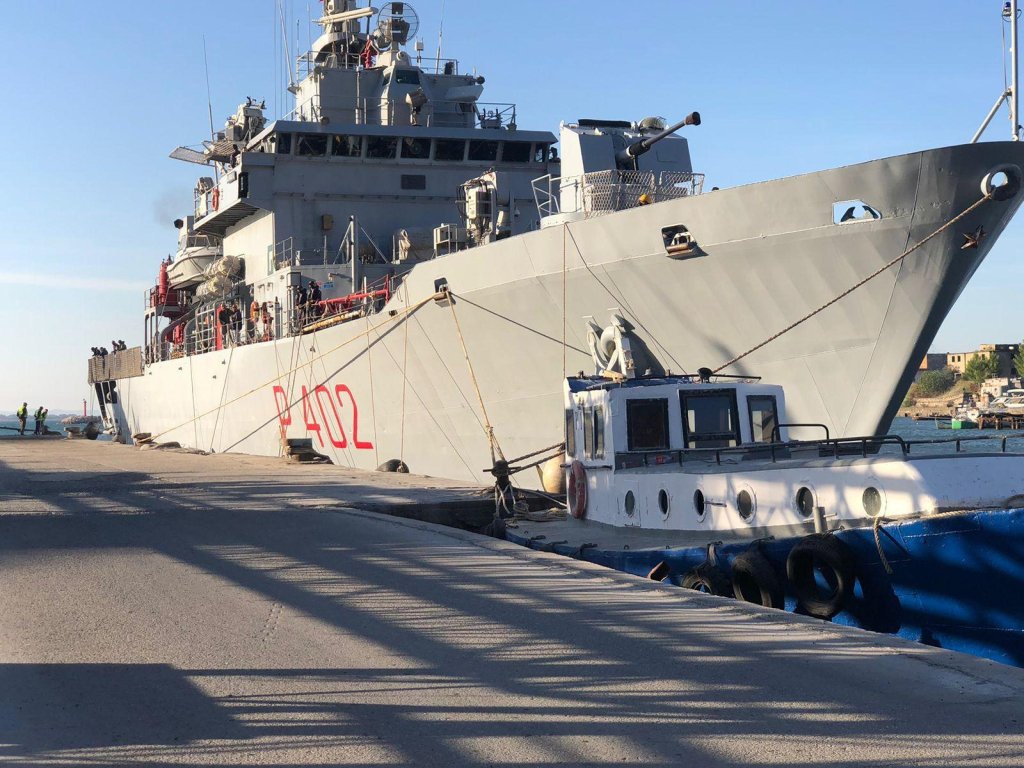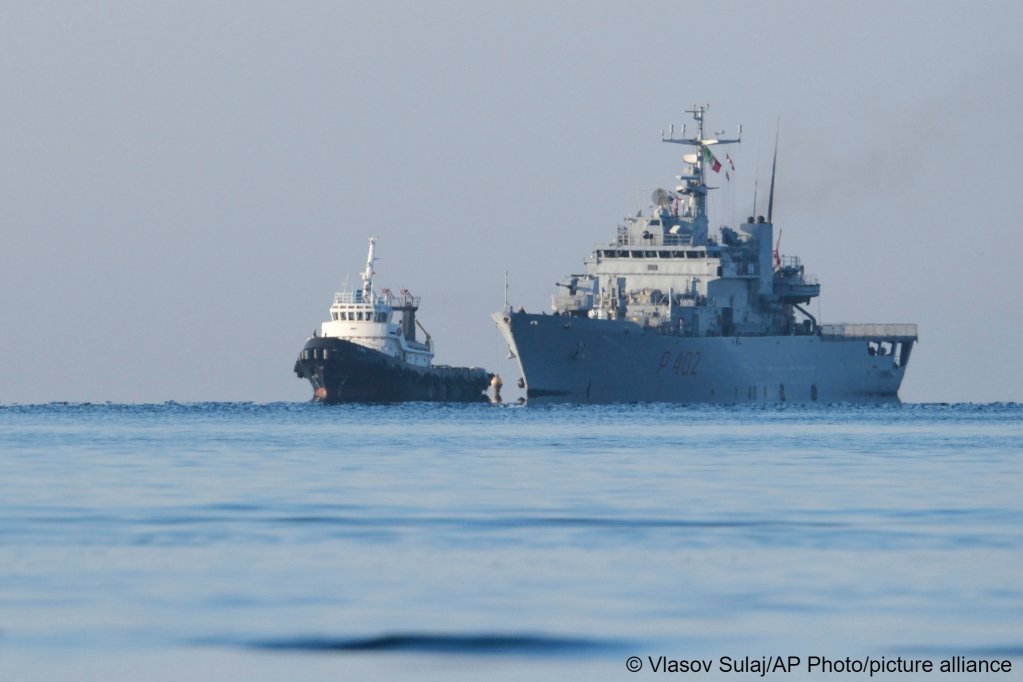On Friday morning, the Italian naval vessel Libra arrived in the Albanian port of Shengjin with eight migrants on board. Italian judges however continue not to validate the detention of asylum seekers in the recently opened centers in Albania.
The Italian naval vessel Libra docked at the Albanian port of Shengjin on Friday morning (November 8). This is the second time the Italian government has attempted to transport migrants picked up in international waters in the Mediterranean to have their asylum claims processed in Albania.
The migrants are the latest candidates for inclusion in accelerated border procedures of a third country, a system that is so far unique in Europe and being tested by the Italian government. In Italy, meanwhile, judges continue to reject the holding of asylum seekers despite a decree issued by the government that has redefined by law the list of safe countries.
On November 6, a court in Palermo, Sicily, ordered the release of a Senegalese national and a Ghanian one. The case revolved around the asylum claim of the Senegalese man, who had attempted to claim asylum on arrival in Porto Empedocle on November 4.
Read AlsoMore migrants to be taken to Albania under Italy deal despite sentences
Palermo judgement
The Italian authorities had detained both men on the grounds they came from so-called "safe" countries. However, the court ordered their release, saying that even if they do come from a "safe" country, that should not have any bearing on the assessment of their individual right to claim asylum.
The judge in Palermo also referred a case to the European Court of Justice (ECJ) regarding the designation of so-called "safe countries." They asked the ECJ specificaly to rule on whether it was possible for an EU member state, such as Italy, to rule that a country was "safe" even when there might be categories of people from that country who might be considered to be at risk.
If the ECJ were to confirm the Palermo judges decision, this could result in a revaulation of the entire Italian system and might prevent them from declaring whole countries "safe" even when there might be areas of that country that could be considered unsafe, or categories of people from that country who might be at risk from their own government and systems of law.
Interior minister says low number due to 'strict screening'
Meanwhile, Interior Minister Matteo Piantedosi says he is assessing the possibility of more appeals, noting that "we are simply ahead of time on a European regulation asking us for 8,000 places for the holding and reception of migrants."
On the Italian government's second attempt to make its Albania plan work, the naval ship Libra has half the number of foreign nationals on board than it did on its first voyage in October. Piantedosi said this was due to very strict screening.
"The checks for vulnerabilities and the meeting of the conditions" required for the transfers "are "very strict," explained Piantedosi. "On the first journey, four were found not to meet the requirements. We excluded a few dozen people because they pulled out their ID cards to avoid being detained."

Piantedosi said that the "deterrence" effect was already working, as there were fewer people pretending they didn't have any documents, and thus, he believed they were creating better "conditions for repatriation." A state cannot repatriate someone without a valid travel document, so once someone shows a valid document, and are proved not to qualify for asylum, they can be potentially repatriated more quickly.
Furthermore, the Italian authorities can only detain a non-vulnerable person who does not identify themselves, with a valid document. In the past, the authorities said that people would arrive saying they had no documents, and then after requesting asylum would disappear while waiting for the reply to their application. These people will now be liable to end up in the centers in Albania.
Read AlsoItalian government says Italy a 'role model' on migration
Opposition
The opposition has decried the entire project, claiming that "we are facing a political propaganda project that wastes public money, a journey that costs 36,000 euros per migrant," said Angelo Bonelli, leader of the Greens and Left Alliance.
This is a stance shared by More Europe secretary Riccardo Magi."This would be funny," he commented, "were it not for the fact that the Albanian repatriation centers are outside European law and are costing Italian taxpayers one billion euros."
Despite the opposition, the Italian authorities say they will continue with the process they tried to begin in mid-October. They will put the eight migrants through health screening and identification procedures at the hotspot, before hoping to transfer them Gjader, where they will be held while waiting for the result of their asylum requests.
However, their detention ordered by the Rome commissioner will have to be signed by the magistrates of the immigration section of the Rome court. This decision is expected to arrive on Sunday.
Rome tribunal decision expected on Sunday
It is possible, that if things go the same way that they did in October, the judges might then order the release of the asylum seekers, due to the "impossibility of recognizing the countries of origin of those detained as safe countries."
This decision came back on October 18, referring to a sentence issued by the ECJ on October 4. That judgement ruled that Member States cannot issue a decision rejecting an asylum application as inadmissible on the basis of the concept of a "safe third country" in cases where they have established that the asylum seeker will not be allowed to enter the territory of a country designated as safe.
Since the Rome Tribunal's first ruling on October 18, the Italian government passed a decree they said would be "effective immediately," which they believe allows them to bypass the EU sentence.
Read AlsoItalian government's Albania plan is mired in legal challenges and criticism

Legal process
The Italian government is still awaiting the outcome of its appeal of the Rome Tribunal's decision. It is also expected, that if a second similar ruling were to be issued by Rome, the government would launch a second appeal against that too. It is unclear how long the process of hearing the appeals might take. Immigration lawyer and ASGI (Italian Association for Juridical Studies on Immigration) associate Lucia Gennari told InfoMigrants that normally such appeals could be expected to take a year or more.
The next key date will be December 4, when the Court of Cassation (Rome's highest appeal court) will issue an answer to the appeal made by the judges employed at the Rome immigration department, on whether they can act with a certain degree of discretion on the assessment of what are safe countries or whether they must simply apply the list drafted by the foreign ministry and contained in the decree.
In the meantime, however, it is likely that they will continue not to authorize the holding of asylum seekers.
